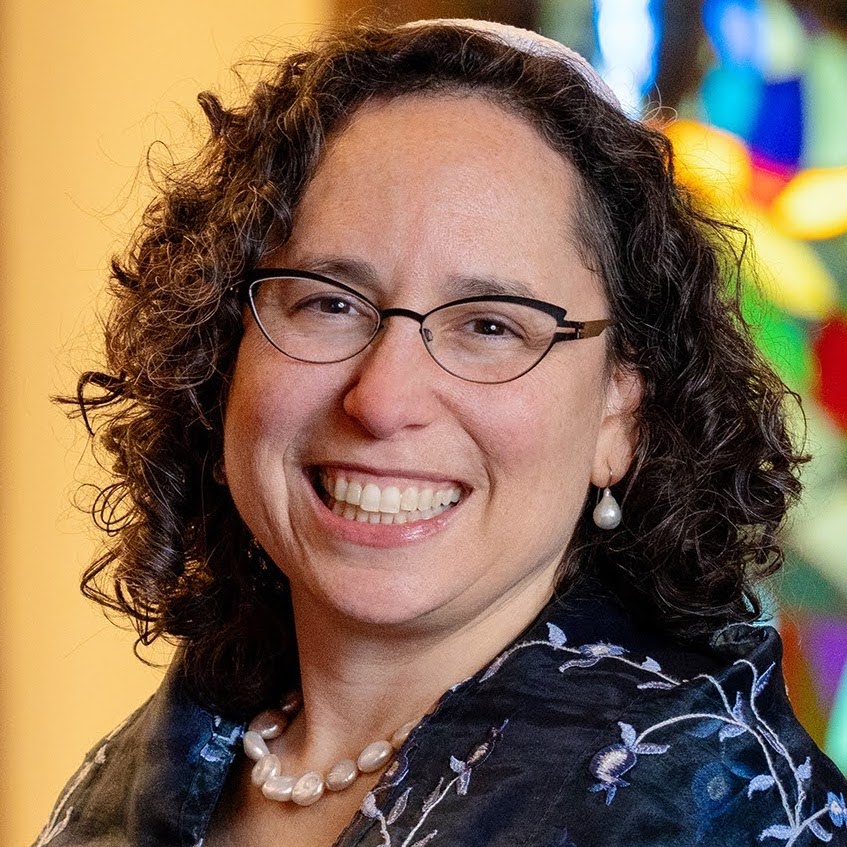(Ki Tissa and Purim) Perhaps For A Time Such as This
Rabbi Julie’s sermon for Parshat Ki Tissa and Purim, March 15, 2025
It may or may not come as a surprise to you that I identify with Queen Esther, the heroine of our Purim Megillah story. It’s not because I have an Uncle Mordecai, though I do have an Uncle Michael. And it’s not because I am under the false impression that I could compete against women from regions equivalent to 127 provinces in the Persian Empire and win a beauty contest. Though I have a positive self-image, feminine beauty has never been my primary source of power, nor would I want it to be. And though both Queen Esther and I have felt the weight of the Jewish people on our shoulders and fought against antisemitism, that too is not the set of commonalities I have in mind. It’s also not the instinct to hide my Jewish identity, though I was raised to keep my Jewish identity quiet when traveling to rural America and certain parts of the world. Rather, I identify with Queen Esther because like her, there have been key moments in my life when I waited for the call to action to come from outside myself.
It is still common in the world of Christian clergy to talk about being called to serve as a religious leader or being called to serve in a particular congregation. And over the course of the past 25 years, I have sometimes been asked by Christian clergy when or what called me to the rabbinate. The Webster Dictionary defines a calling as “a strong inner impulse toward a particular course of action, especially when accompanied by conviction of divine influence.” In Jewish circles, it’s much more common for people to ask what made you decide to become a rabbi? I don’t think I’ve ever been asked by someone Jewish if I feel that God called me to this role. And when I was considering becoming a rabbi, as a college student in the early 1990’s, it was still very new for women to be able to serve as rabbis in the Conservative Movement. I was drawn to the possibility of becoming a rabbi, but I felt very unsure about it. The strong inner impulse to a particular course of action was there, but something external was missing. And it wasn’t some kind of sign from God that I was looking for, after all I didn’t imagine that God would ever tap me in such a way. But I was looking for some kind of external validation that this was the path I was destined to take.
For those of you who joined us to celebrate Purim on Thursday night, I’m sure you had no trouble following the Megillah reading closely because there wasn’t that much chaos and the din of chatter and excitement from little kids wasn’t very much at all. But in case you were distracted for a moment, I want to remind you of what happens in chapter four of the Book of Esther. After learning of Haman’s evil plan to murder all the Jews, Mordecai “tore his clothes, put on sackcloth and ashes, and went out into the city, wailing loudly and bitterly.” This general calling out, though maybe cathartic, did not really get him anywhere. And the first time Mordecai calls upon Esther to do something, lavo el ha-melech, to go and meet with the king and beg and plead for him to save her people’s lives, she refuses to go before the king without being summoned.
It is only when he relays these famous words that Esther is called to action: “Do not imagine that you, of all the Jews, will escape with your life by being in the king’s palace. On the contrary, if you keep silent in this crisis, relief and deliverance will come to the Jews from another quarter, while you and your father’s house will perish. Mi Yodeiah im la’eit k’azot higiat l’malchut, And who knows, perhaps you have attained to royal position for just such a crisis.” It’s hard to know if Esther was ultimately motivated by the fear that if she did nothing she would perish or by the inspiration that she was uniquely positioned to save her people, or both. But this second more specific and more urgent call from Mordecai seems to move Esther to summon the courage to go to the king to save her people. But not quite. When Esther asks for all the Jews in Susa to fast for her for three days, along with her and her attendants, she is seeking widespread communal support and solidarity, a call not just from Mordecai, but from the entire people.
Esther is not called by God, for God’s name is completely absent from the entire Book of Esther. She is called by family and by the community. But other famous leaders in Jewish history – leaders like Abraham and Moses are directly called by God. When Abraham was called, lech lecha, “go forth from your native land and from your father’s house to the land that I will show you.” He responds without hesitation and goes forth just as God commanded him.[1] But when Moses is called by God, to go to Pharoah to take the Children of Israel out of Egypt, he equivocates and doubts himself, saying, mi anochi ki elech el Paro, who am I that should go before Pharoah?”[2] He is then worried that he will not have the trust of the people, that the people will not believe him when he says God called him to lead them out of Egypt. Then Moses returns to his own sense of inadequacy, this time focused on his difficulty with words. It is only with the added reassurance of having his brother Aaron by his side that Moses is willing to answer God’s call. If only Moses and Aaron were leading more side by side in this week’s parshah, Ki Tissa, maybe we could have avoided the golden calf and the broken tablets all together.
In each of these examples, the call manifests differently. Abraham is called to travel an uncharted path and he feels a strong inner impulse to do so. He meets the textbook definition of a calling – he has the confidence or the curiosity or the passion or the sense of purpose to take a particular course of action accompanied by conviction of divine influence. Moses has the clear external call from God – in the form of an extended exchange, a direct conversation but he initially lacks the inner impulse to confront Pharoah and lead the People out of Egypt. And Queen Esther is called, not by God, but by Mordecai and her people. She, like Moses, hesitates at first, but then once she finds her inner impulse to respond, finds the courage and formulates the plan to save her People.
In this week’s Torah portion, Ki Tissa, Aaron too answers the call of the people, when Moses is delayed in coming back to them, when Moses is delayed in coming down from Mount Sinai. When the people gather around Aaron and say, kum, asei lanu Elohim asher yelchu l’fanenu”, arise, make us a god who will go before us, for that guy Moses – the man who brought us from the land of Egypt – we do not know what happened him. And Aaron, does not say, that guy Moses, he’s my brother, he’s our leader, he’s coming back. Aaron, the High Priest, who was clothed in splendor with the purple and crimson and the ephod and the urim and thummim, just last week in the previous Torah portion doesn’t pause to listen for any other call, whether a stronger inner impulse to do the right thing or a hint of an external call from God. Instead, he listens to the call of the mob before him and takes their gold and casts it into a mold and makes a golden calf. And when the people exclaim, ‘This is your God, O Israel, who brought you out of Egypt’, he doesn’t counter them. Rather he builds an altar and declares that the next day will be a festival for the Lord.
Even if we read Aaron’s role generously, as many of the commentators do, saying that he was trying to delay the people – he never thought they would give up their gold, how he hoped Moses would come down from the mountain before he finished casting the mold, how he declared the chag l’Adonai, the holiday for the next day rather than for the very same day, Aaron listened to the wrong external call and completely lacked or at least ignored his own moral compass. Aaron, who stood side by side with Moses against Pharoah called by God to lead the people out of Egypt, painfully pursues the wrong course of action in this moment with disastrous consequences. How I wish he has listened for the ‘kol d’mamma daka’ the still small voice of the Elijah story, how I wished he knew that God wasn’t only in the thunder and in the lighting and the booming voice of Sinai but also in the quiet, almost imperceptible internal to do the right thing.
In our lives, we are called upon to make many choices, big and small, each and every day. Sometimes those choices will determine the direction of our lives for many years to come – the choice of a particular career path or the way we spend our retirement, the choice of a life partner or a community, the choice of how we step up as Jews or Americans, the choice of how we use our gifts. And sometimes those choices seem obvious, either because of a strong internal pull or a strong external call, or perhaps both, but often the path ahead is unclear or we hesitate for one reason or another. We are living in a time in Jewish history where God no longer calls to us as God called to Abraham and Moses. We are living in a time when like Elijah we need to listen to the ‘still, small, voice,’ or like Esther we need to listen to the call from people around us we know and trust. My prayer is that when we act without hesitation it will be for the good and when we hesitate to believe in ourselves or to use our gifts or take courageous action, we will be encouraged by those around us or find encouragement within.
Shabbat Shalom.
[1] Genesis 12:1-4.
[2] Exodus 3: 10-11.
Other Sermons and Talks from the Bimah
See the blog category: Sermons & Talks
Video Archive
The archive of all Shomrei videos is available on our YouTube Channel at shomrei.org/video

